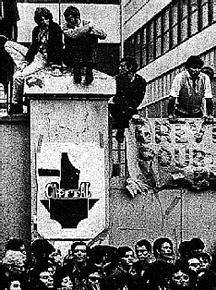| School | Troops | Resources |
The Neo-Marxian Schools
("Radical Political Economy")

During the inter-war period, while Marxism rose as major political force, paradoxically, Marxian economics fell into neglect, at least outside of committed Marxist circles. After an iffy start, Neoclassical economics was gaining ground, making Classical-derived economic theories, like Karl Marx's, seem apparently quaint and obsolete. Institutionalism had also robbed it of some of its thunder. The practical political and economic problems of the inter-war period, the rise of Fascism, the "Red Scare" in America (and elsewhere), the widening of Marxian theory to sociology and philosophy, the Soviet-inspired focus on planning, had obscured the economic theory in Marx's work. One can almost say that, by the 1940s, most people (particularly in the United States and Great Britain) had already forgotten that Marx himself had been an economist at all!
In the 1940s, several English-language works by prominent economists began to emerge which took Karl Marx seriously as an economist -- notably, by Maurice H. Dobb (1937, 1946), Joan Robinson (1942) and Paul Sweezy (1942). This was followed up by two other influential works by Paul Baran (1957) and Ernst Mandel (1962), that finally began putting Marxian economics on the economics map.
The works of Sweezy and Robinson are particularly notable for having brought attention to Marx's theory of value -- thus leading to the re-emergence of the old "transformation problem" that had bedeviled the old Marxians. Joan Robinson (1942) was unimpressed and argued that that Marxian economics should do without the labour theory of value -- a proposition that Oskar Lange (1935) had earlier recommended.
Sweezy disagreed -- and several prominent economists, such as Ronald Meek (1956), Francis Seton (1957), Nubuo Okishio (1963), Andras Bródy (1970), Paul A. Samuelson (1971), Michio Morishima (1973), William J. Baumol (1974), Domenico Nuti (1977) Anwar Shaikh, Gerard Dumenil (1980), Duncan Foley (1986) and many others have attempted to grapple with the formal and logical foundations of Marx's theory of value. However, the appearance of Piero Sraffa's (1960) work on the Classical Ricardian System has led some (e.g. Ian Steedman, 1977) to suggest that the Marxian labor theory of value can be subsumed in the more general "Neo-Ricardian" theory.
Sweezy's 1942 book also set out the Bauer model of the breakdown of capitalism, which was subsequently corrected in the formal treatments of Evsey Domar (1948), Josef Steindl (1952) and Nicholas Georgescu-Roegen (1960). Fel'dman's work on two-sector growth models was resurrected by Alexander Erlich (1953) and Evsey Domar (1957) and were later taken up with gusto everywhere.
The work of the Americans Paul Baran (1957) and, later, Baran and Sweezy (1966) was particularly tailored to the post-war boom in the Western capitalist economies, which seemed to invalidate the "chronic depression" which the older Marxists had anticipated. Marx's law of diminishing rate of profit did not seem to be working. What Baran and Sweezy proposed was that in situations of monopoly capitalism there is no such tendency as prices are based on "mark-up". Consequently, the source of crises is in the tendency for a rise in surplus. Under monopoly capitalism, there is a need for an external source of demand and profitable outlets for investment. This makes monopoly capitalism more aggressively outwardly looking than competitive capitalism. It is on this basis that Baran and Sweezy develop their distinct theory of imperialism and center-periphery dependency which accounts for the state of economic underdevelopment in the world today.
In France, Ernest Mandel (1962) sought to embed to source of crises not in the rise of surplus but in the law of diminishing profit rate over Kondratiev long waves. Profit rates, he claims, determine the rate of accumulation, and the rate of accumulation generates the waves.
The line which Baran, Sweezy and Mandel initiated is sometimes called "Neo-Marxist" school or simply "Radical Political Economy", which broke open a tidal wave of work in the 1960s and 1970s. The main channels was the New Left Review, the Monthly Review Press, and later on, the Review of Radical Political Economy.
There have been numerous "offshoot" Neo-Marxist schools which have taken on many of the themes and conclusions of the Marxian school, although they should not be considered rigorous applications of classical Marxian theory. We note only the related "Dependency School" of development associated with Raul Prébisch and Andre Gunder Frank, the "World Systems" school associated with Immanuel Wallerstein and the work on radical political economy of David M. Gordon, Samuel Bowles, Herbert Gintis and others. A separate (and unrelated) school is the "Analytical Marxian" school, normally associated with the work of John E. Roemer and John Elster, which attempts to reduce some of the Marxian propositions to conventional, methodological individualism (i.e. with utility-maximizing rational agents, etc.).
There have also been post-war developments in Marxian economics in other countries which, although highly influential, have not yet broached the English-languange market. Japanese Marxism, for instance, has long been a source for traditional work -- indeed, the Marxian school was almost the "orthodoxy" in Japanese academia for a while. Besides Michio Morishima and Shigeto Tsuru, the work of Kozo Uno, Nubuo Okishio and Makoto Itoh are particularly notable. The work of the French Regulation School (Robert Boyer, Michel Aglietta, Alain Lipietz, etc.) is a bit more eclectic in its foundation, closer to the Post Keynesians in its approach.
| Immediate Predecessors
Neo-Marxism/Radical Political Economy
|
| HET |
|
Resources on Neo-Marxian Economics
|
All rights reserved, Gonçalo L. Fonseca
